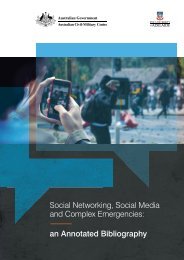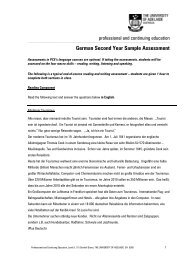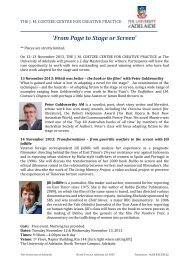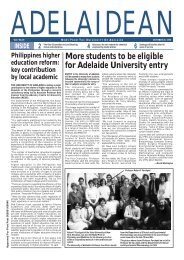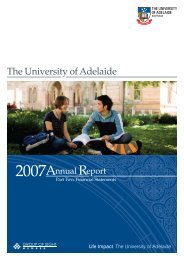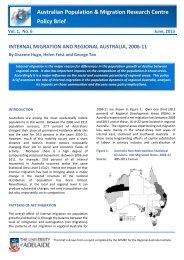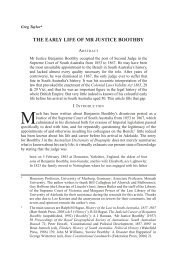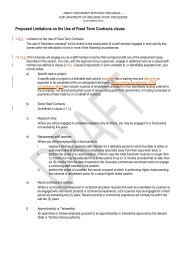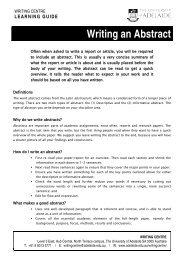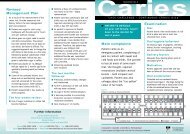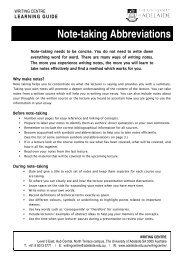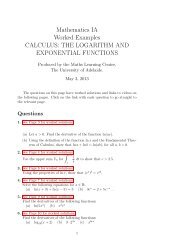Unbridling the Tongues of Women - The University of Adelaide
Unbridling the Tongues of Women - The University of Adelaide
Unbridling the Tongues of Women - The University of Adelaide
You also want an ePaper? Increase the reach of your titles
YUMPU automatically turns print PDFs into web optimized ePapers that Google loves.
<strong>Unbridling</strong> <strong>the</strong> tongues <strong>of</strong> women<br />
Hartley was made <strong>the</strong> Council’s permanent, salaried president, so that <strong>the</strong> regulations<br />
were very largely his work. In 1878 parliament passed ano<strong>the</strong>r Education Act<br />
which, while it reorganised <strong>the</strong> central administration and its relations with <strong>the</strong><br />
government, did not materially alter <strong>the</strong> provisions <strong>of</strong> <strong>the</strong> 1875 Act. 24 Hartley, with<br />
<strong>the</strong> new title <strong>of</strong> Inspector-General, remained in executive control <strong>of</strong> <strong>the</strong> colony’s<br />
public education. As chairman <strong>of</strong> <strong>the</strong> Board in 1874, he drew criticism for his attempts<br />
to make <strong>the</strong> education system more efficient. As president <strong>of</strong> <strong>the</strong> Council,<br />
which controlled courses <strong>of</strong> instruction and standards <strong>of</strong> education within schools,<br />
appointments, removals, examinations, certification and salaries <strong>of</strong> teachers, he was<br />
widely and emphatically criticised as authoritarian and centralist. 25 After reading<br />
a particularly violent attack on him in <strong>the</strong> press, Spence was so distressed that she<br />
could not sleep. She did not, <strong>the</strong>n, know him personally, but that did not stop her:<br />
at one o’clock in <strong>the</strong> morning she got out <strong>of</strong> bed and wrote to him <strong>of</strong>fering her<br />
sympathy and support. 26 Hartley responded, and <strong>the</strong>ir subsequent friendship led<br />
to Spence’s active involvement in South Australia’s public education. It led, too, to<br />
her first <strong>of</strong>ficial appointment to a public <strong>of</strong>fice, to a recognised place in <strong>the</strong> public<br />
world <strong>of</strong> men.<br />
<strong>The</strong> Education Act <strong>of</strong> 1875 made elementary education compulsory, and provided<br />
for appointment <strong>of</strong> local boards <strong>of</strong> advice to supervise school attendances and<br />
to inform <strong>the</strong> Council <strong>of</strong> local requirements. 27 Implementation was slow, but in<br />
November 1877, Spence wrote triumphantly to C. H. Pearson, a pr<strong>of</strong>essor <strong>of</strong> history<br />
who had emigrated from London to South Australia, and had <strong>the</strong>n gone on to<br />
Melbourne to lecture at <strong>the</strong> university and, as headmaster, to rule over <strong>the</strong> Presbyterian<br />
Ladies College. 28 ‘I am a member <strong>of</strong> <strong>the</strong> Board <strong>of</strong> Advice for <strong>the</strong> School District<br />
<strong>of</strong> East Torrens’, she boasted, ‘and I hope in time to have a seat on <strong>the</strong> Council <strong>of</strong><br />
Education itself’. 29 She had every reason to be proud. She was <strong>the</strong> first woman in<br />
South Australia to gain such a public appointment. 30 However, while she announced<br />
this at <strong>the</strong> beginning <strong>of</strong> a chapter in her autobiography, she made less, <strong>the</strong>re, <strong>of</strong> this<br />
achievement than <strong>of</strong> her work with <strong>the</strong> Boarding-Out Society and, subsequently,<br />
with <strong>the</strong> Register. Perhaps she saw her work for a local school board, rightly, as less<br />
central to <strong>the</strong> development <strong>of</strong> a state instrumentality than <strong>the</strong> work she was engaged<br />
in with Emily Clark. Perhaps she was to see it, again rightly, as making far less <strong>of</strong><br />
an inroad into <strong>the</strong> public sphere than her work for <strong>the</strong> Register would carve. But it<br />
is most likely that she learned to dislike <strong>the</strong> work that her membership <strong>of</strong> <strong>the</strong> East<br />
Torrens School Board involved.<br />
100



